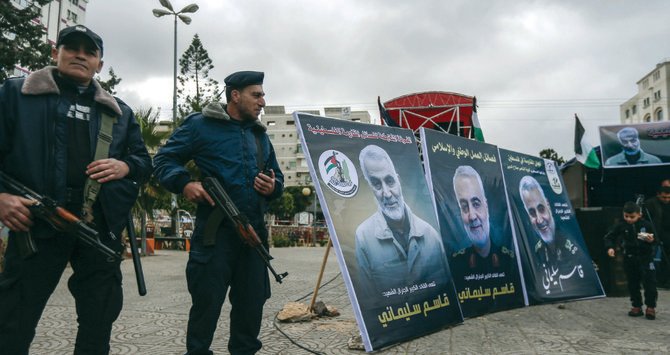
- ARAB NEWS
- 01 Jul 2025

Hazem Balousha
GAZA CITY: A picture of the late Iranian Quds Force commander Gen. Qassem Soleimani that was posted on a billboard in Gaza City has been vandalized and torn down, days before the first anniversary of his death.
Soleimani was killed in a US drone strike near Baghdad Airport on Jan. 3, 2020.
The Gaza picture bore the phrase “the martyr of Jerusalem,” which was uttered by the head of Hamas’ political bureau Ismail Haniyeh at Soleimani’s funeral.
Hamas has publicly praised Iran during the past few years as it is the most prominent supporter of developing the movement’s military capabilities.
But Palestinians and Arabs view Soleimani as a war criminal, involved in massacres against Syrian and Iraqi civilians through his direct intervention in military operations in both countries.
The poster was put up by an unknown group believed to be affiliated with Hamas and Iran-backed factions.
Hamas security forces arrested Sheikh Majdi Al-Maghribi, who was at the front of the group that tore down the image, according to his family and those close to him.
Al-Maghribi wrote on Facebook: “Every hero can remove this shame from the land of Gaza. Let him blur, rip, and distort these images … A shame for this filth remaining above our heads.”
The appearance of the poster also coincided with a military exercise in the Gaza Strip that involved the participation of Hamas and 12 military wings, most of which acknowledge Iranian support.
A few days ago, a prominent Hamas leader, Mahmoud Al-Zahar, said that Soleimani had handed him $22 million during their first meeting in 2006 when he was Gaza’s foreign minister.
A member of the Political Bureau of the People’s Party, Walid Al-Awad, said that displaying Soleimani’s image at this time was unnecessary and would negatively affect Gaza because it would either pay the price at the hands of Israel or lose ties with Arab countries.
“Raising Soleimani’s picture is a step that will be exaggerated in a way that places Gaza in the circle of Iranian terrorism,” he added.
A member of the political bureau of the Democratic Front for the Liberation of Palestine, Talal Abu Zarifa, said the general’s picture would lead Gaza into a “maze and great and dangerous political entanglements” and lose the support of Arab countries instead of having them on side at a time when the Palestinian cause was going through a great impasse.
Activist Ahmed Silmi also rejected the justifications for showing Soleimani’s image with Iranian support for Palestinian factions. “The resistance is not only a military action, but it is a moral clarity in order to be worthy of the people’s bias toward you and their feeling motivated in adopting your causes. The interest in building an arsenal of weapons alone at the expense of concern for moral clarity has a heavy price.”
Hezbollah possessed an arsenal of weapons greater than Gaza but had become a pariah in the consciousness of Muslim peoples, so its weapons had not satisfied it, he added.
Political science professor Hussam Al-Dajani at Umma University said controversy accompanied everything in Gaza, whether it was a picture of Egyptian President Abdel Fattah El-Sisi Sisi, Soleimani, or an Emirati aid convoy.
“Our whole lives are controversies, and although this debate is healthy and useful, we should know that politics is governed by interests, not principles, even if we disagree on that,” he said.
It is the second time that Soleimani’s picture has been raised in Gaza. The first was in a mourning marquee set up for him by Hamas, Islamic Jihad, the Popular Front for the Liberation of Palestine and the Popular Resistance Committees.
Hamas official Ismail Radwan said at the time: “We will remain in the Gaza Strip loyal to those who supported Palestine and developed the capabilities of the factions.”